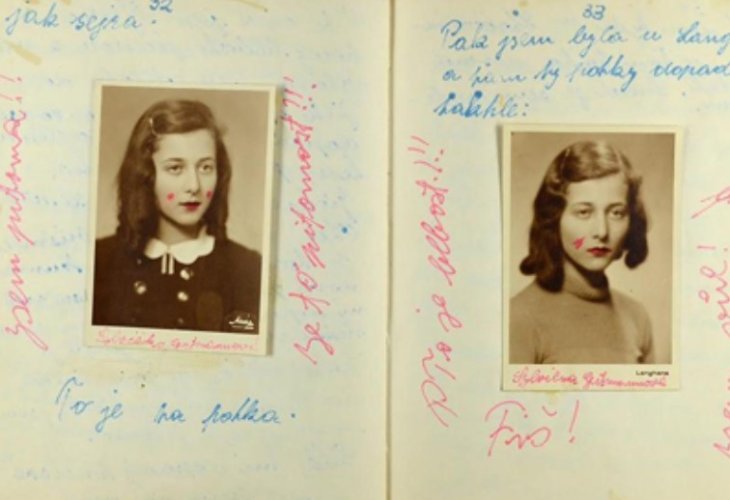The Holocaust
Sylvia Gutmanová’s Diary: Childhood in Terezín
A child's diary that transforms historical deportation statistics into a poignant, first-person account
 Photos of Silvia in the diary she wrote (Courtesy of the Ghetto Fighters' House)
Photos of Silvia in the diary she wrote (Courtesy of the Ghetto Fighters' House)Silvia Gutmanová was only 9 years old when the Sudetenland in Czechoslovakia was annexed to Germany, and 10 when Czechoslovakia was fully occupied by the Nazis. Silvia wrote her diary during the years 1941-1942, and most of it pertains to her personal experiences in society and school. Only between the lines did Silvia mention the horrors of the war.
The first lines in the diary were written on September 11, 1941. "The day before yesterday was wonderful," Silvia wrote. "First, I returned home from the hospital, where I had stayed for six weeks after a fall. Second, I received this diary, and third, I got 100 crowns from my father for a bicycle. I am also saving in a piggy bank and separately in an envelope until I have a thousand crowns for a bicycle. I already have 700 crowns, and I hope we'll buy the bike soon."
She continued to write: "Before the fall, I rode on my cousin's bike, and now I can’t because I'm barely walking, and for the next 14 days, I’m not allowed to meet other children. It’s terribly stupid. I’m not allowed to go to school... I’m not allowed to sit in the kitchen because Jiray, Peter, and Edita are there. We rent from Uncle Aule, whom I used to be terribly afraid of."
On one of the days, Silvia wrote: "Today it's raining, so I can't go outside. It was really a brilliant idea by Grandma to buy me a diary, especially with a key. My sister keeps a diary, but she writes in a notebook and locks it in a safe. At the time, Peter put a phonograph key in there for her. If he is that curious, I’ll have to be careful."
Silvia mentions casually the marking of Jews with a yellow patch. "These days we are supposed to get a marking to show we are Jews. I am curious about this," she wrote on September 16, 1941. A week later, she notes that "we have had markings for a while now, and it’s not that terrible."
The clouds of war are gathering, and the situation is worsening. In another passage Silvia wrote, she mentions again the symbols of the yellow star. "Since I last wrote in the diary, a lot has changed. We bear symbols that show we're Jews, those yellow stars. Lots of people are traveling to Poland now, and it will reach us too," she wrote.
Silvia describes a heartbreaking scene she witnessed: "Yesterday when I was walking home, on Melange Street, elderly women were selling lemons that are usually not for sale at all. I saw a Jew with a beard, how he stopped a few steps before an old woman with lemons. He stood there for a few moments and looked at her. Then, suddenly, he moved and approached her, but immediately changed his mind, looked at his watch, and walked away with a sad expression on his face, which made me burst into tears. I thought that maybe he has a sick child at home who can’t be without lemon, and now he can’t buy the lemons."
The winds of war already rage in the streets of Czechoslovakia. December 1941, and Silvia is already describing the harsh scenes of Jews being transferred to camps. "I haven’t written in the diary for a long time. I am terribly lazy and forgetful. Meanwhile, a lot of things have changed. The transports to Poland continue, now to Theresienstadt. Zuzana's (Silvia's sister) boyfriend, Bedi, went, and she cried all the time about it before. Tomorrow Edith Marrer, her mother and father, and grandmother (from whom I got the diary), and grandfather. And Edith Morgenstern. I am completely shocked."
The last time Silvia wrote in her diary was in April 1942, a week after her 13th birthday. "No news. School has started. It's disgusting. There’s a test tomorrow; I don’t care about it at all. I’ll get a low grade, and well, nothing will happen. There are transports again, and this is terribly hopeless," wrote the girl, whose life ended a few weeks later.
On May 7, 1942, less than a month later, Silvia, her parents Simon and Stefanka, and her sister Zuzana were sent to Theresienstadt Ghetto. After about a month in the ghetto, they were sent to the Sobibor extermination camp, where they were murdered. May the Lord avenge their blood.

